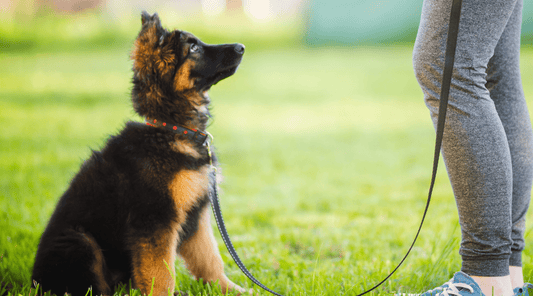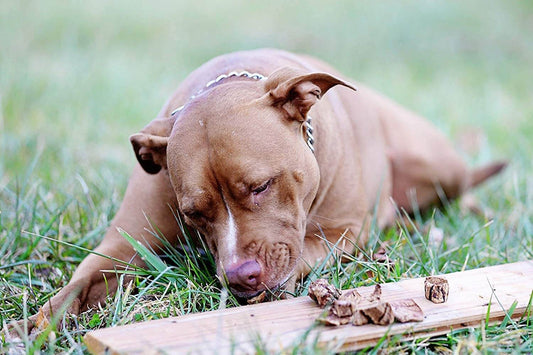
Dog Gut Health: A Tale of Eternal Stench
Dawn Miller Apr 05, 20255 Minute ReadSometimes signs of digestive problems in dogs are easy to spot.
So, let’s talk about Bruno.
More specifically, let’s talk about Bruno’s belly—which decided to start speaking its own language after he snagged someone’s half-eaten fast food burrito left carelessly on a park bench when I wasn't looking.
Before I could say "leave it", he'd downed the whole thing, greasy wrapper and all.
Let's just say that evening was aromatic. Pixie pranced around the regretful pup, unable to get comfortable on his favorite rug. With each lap, I imagined she was telling him, "told you so".
Bruno's belly grumbled loud enough that I could hear it over the movie. And the stench now lingered in the room like a ghostly presence.
With Bruno's mistake in mind, let's talk dog diarrhea causes and treatment and the best dog treats for sensitive stomachs.
Spoiler: they're not park bench burritos.
Why Dog Gut Health Deserves a Spotlight in Your Routine
You have a routine with your dog: meal times, walks, grooming, potty, cuddling, training. I'll make the case that your dog's gut health deserves a more prominent place in your daily dog schedule.
The gut isn’t just for digestion. It’s basically your dog’s second brain. A healthy gut microbiome produces serotonin, known as the happiness hormone. It regulates mood and energy levels.
The bulk of a dog's immune system also happens to be in the gut.
So, if a dog's gut health is off on a regular basis, it can impact their mood, energy, propensity to catch every canine cold they come in contact with, and overall dog health.
You can even see it in the appearance of their skin and coat. Dull, wiry, brittle hair and flaky skin are not normal for any dog breed.
So, yep, if your dog is acting uncharacteristically, dog gut health—rather, lack thereof—is one of the first culprits to explore.
Common Signs of Digestive Problems in Dogs
Every dog gets a little gassy now and then (especially after sneaking people food), and I'm sure sometimes it's so worth it.
But here are a few red flags to watch out for:
- Chronic or frequent dog diarrhea
- Constipation or straining to go
- Gurgly, bloated belly, especially if the volume is competing with action scenes in your movie
- Excessive gas (the kind that clears rooms)
- Vomiting, even occasionally
- A sudden change in appetite
- Grass eating followed by barfing (we’ve all been there)
Now, some breeds are known for having more tempermental tummies. If you've ever had a bulldog or pug, you got used to that "It wasn't me" dog grin as the room fills up with "fumes" of an unknown origen. Boxers, goldens, beagles, some terriers, and all flat nose dogs have this smelly reputation. Because they have a flat nose, they swallow extra air when they eat.
If they weren't so adoreable, we wouldn't put up with it. After all, we're the ones who bred them that way.
Dog Diarrhea Causes and Treatment (Dealing with The Unfun Stuff)
No one wants to talk about it, or clean it up, but as a dog parent, you've probably had the honor.
There are tons of things that can trigger a bout of diarrhea in dogs:
- Sudden diet changes
- Stress or anxiety
- Parasites or infections
- Food intolerances
- Overeating
- Garbage raids (Bruno, again)
Treatment
- Assess their diet (and probably limit people foods)
- Lots of water (use watered kibble if you don't see them drinking enough)
- Enhance canine nutrition
- Sometimes a vet visit is needed if it doesn't resolve itself
How to Support Gut Health Through Diet
Honestly, the best place to start? Their dog bowl.
A dog's diet should include:
- A quality kibble
- Enough protein (Hint: most dogs need more than kibble can provide)
- Relatively low saturated fat. Too much fat can irritate the pancreas, making digestion more difficult.
- Low fillers (more fillers mean they have to eat more calories to get enough protein, which can lead to fat gain and metabolic issues. Corn, soy, wheat—basically junk food in the quantities found in some kibble.)
- Easy to digest (dogs evolved to eat meat, but they're omnivores and need fiber too!)
- Nutritious dog treats and dog bones, no fillers, just canine nutrition.
- Omega 3 and 6, which reduce inflammation and gut overreactions by supporting balanced immune responses
- And most importantly, collagen, the structural protein that makes up the digestive tract lining. (If this lining is in rough shape the digestive system is more susceptible to irritants.)
If you have a dog with a sensitive stomach, look for the best dog treats for sensitive stomachs—single-ingredient treats that are simple, clean, and gentle on the gut.
The Best Dog Treats for Sensitive Stomachs
I always reach for K9 Connoisseur dog treats. Bruno’s sensitive belly handles them just fine, and Pixie? She’d sell state secrets for a beef lung bite.
And yes, that was just a shameless plug for my dogs' favorite dog treats.
These are packed with collagen and healthy fats. We use these roasted organ meat bites for dog training sessions. Nothing gets a dog motivated like the smell of real beef.
There's nothing funny there to mess with Bruno's stomach. And as a human, I can't smell them. I'm happy about that.
Second, I'll recommend beef marrow dog bones. But it's important that they're grass-fed. Grass-fed beef has 2.5X more omega-3 than grain-fed cattle with less saturated fat. That bone marrow is also great source of protein, especially collagen, along with essential vitamins and minerals.
Regular dog bone sessions can also ease anxiety and reduce destructive chewing. So, if a dog's stomach upset is related to nervousness, introducing a dog bone routine can certainly help.
Bruno gets one after dinner a few nights a week. He gnaws, he sighs, he settles into a food coma. And most importantly—his belly stays quiet.
Want to Learn More About Total Dog Wellness?
Whether you’re working on leash manners, improved digestion, or just looking to bond better with your pup, spending time training your dog may be just the thing to ease sour stomachs and improve overall dog health.
A well-trained dog is a confident dog. Because they learn to follow your lead, it's easier to keep them safe from toxic burritos...although Bruno moments happen.
I invite your to join me for the 7-Day Dog Training Challenge. You'll get
- Easy-to-follow training videos
- Tips on using treats effectively (including those gut-friendly ones)
- Certificates for every command your dog learns
- A plan to build consistency, confidence, and trust
Sign up here:
👉 Join the Challenge
Final Thoughts on Bruno's Belly
✔ Your dog’s gut health is connected to almost everything—from energy levels to coat quality.
✔ Watch for subtle signs like gas, weird poop, and food pickiness.
✔ Choose single-ingredient dog treats that support digestion, not disrupt it.
✔ Natural dog bones with marrow help stimulate digestion and satisfy chew cravings.
And if you’ve ever had to crack the windows on a January drive because of a mystery fart in the backseat… you already know: gut health matters.
Available On:
Disclosure: This article may contain affiliate links, which means we may earn a small commission if you make a purchase through these links—at no extra cost to you. We only recommend products we trust and believe will benefit you and your K9.





